

“The Internet of Us” and the End of Facts. Ted Cruz’s campaign autobiography is called “A Time for Truth.”

“This guy’s a liar,” Donald Trump said at a recent G.O.P. debate, pointing at Cruz. Trump thinks a lot of people are liars, especially politicians (Jeb Bush: “Lying on campaign trail!”) Pretty Good, episode 6: The Dumbest Boy Alive. In 2008, there was an argument on a message board.
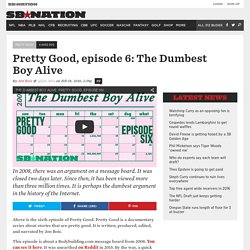
It was closed two days later. Since then, it has been viewed more than three million times. It is perhaps the dumbest argument in the history of the Internet. «Fluctuat nec mergitur»: ce que veut dire cette phrase devenue virale. Did the media ignore the Beirut bombings? Or did readers? If social media is an expression of public sentiment, then it seems significant that perhaps the most widely shared tweet on Friday's terror attacks in Paris was not about Paris at all but rather was about another terror attack, earlier that week, in Beirut: The photo in this tweet is not, in fact, from last week's blast in Beirut.

Rather, it is from 2006, during Israel's war against Hezbollah in Lebanon. But what is most striking to me about this tweet, now shared by well over 50,000 people, is that it's wrong: The media has, in fact, covered the Beirut bombings extensively. The New York Times covered it. NSA-proof messaging app Wickr gains £17m in funding. A free app that promises to help you send surveillance-proof, self-destructing, encrypted messages has just secured $30m (£17m) in funding.

Wickr, launched in 2012, was developed by Wired 2014 speaker Nico Sell, the organiser behind the world's largest hacker get together, Def Con. The company's motto is Leave No Trace, and that's exactly what Sell plans to teach the public, having already publicly rebuffed the FBI's requests for her to create a backdoor into the app for them. Unlike Snapchat, which proved earlier in the year to be neither self-destructing, nor all that secure, Wickr promises "military-grade encryption" it does not have the keys to, it erases unwanted files completely and requires no personal information from a user. How PowerPoint is killing critical thought. I still remember the best lecture I ever attended.
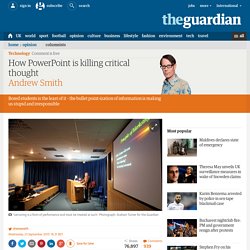
It was part of a joint series offered by the English and philosophy departments in my first term at university and, given that the subject was Sartre’s Being and Nothingness, should have been the dullest event in Christendom that night. But it wasn’t. The lecturer, Thomas Baldwin, had a deceptively simple style: he would write a proposition on the blackboard facing us and gaze at it for a moment, like a medium beckoning a spirit. The Organized Mind: How to better structure our time in the age of social media and constant distraction. The information age is drowning us in a deluge of data, and it is becoming increasingly difficult to separate facts from pseudo-facts, objective from biased sources, and at the same time, we’re all being asked to do more at home and at work.
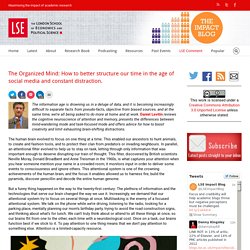
Daniel Levitin reviews the cognitive neuroscience of attention and memory, presents the differences between mind-wandering mode and task-focused mode and offers advice for how to boost creativity and limit exhausting brain-shifting distractions. The human brain evolved to focus on one thing at a time. Emotion regulation, procrastination, and watching cat videos online: Who watches Internet cats, why, and to what effect? Highlights A survey of nearly 7000 Internet users tested associations between personality traits, past behavior, and viewing cat-related media online.
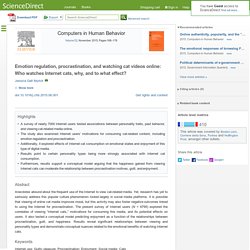
The study also examined Internet users’ motivations for consuming cat-related content, including emotion regulation and procrastination. Additionally, it explored effects of Internet cat consumption on emotional states and enjoyment of this type of digital media. Results point to certain personality types being more strongly associated with Internet cat consumption. Furthermore, results support a conceptual model arguing that the happiness gained from viewing Internet cats can moderate the relationship between procrastination motives, guilt, and enjoyment.
Abstract Anecdotes abound about the frequent use of the Internet to view cat-related media. Keywords Internet use; Guilty pleasure; Procrastination; Enjoyment; Social media; Cats 1. Anecdotes and news reports suggest that viewing videos and photos of cats is a common use of the Internet. 6 links that will show you what Google knows about you — Productivity in the Cloud. 6 links that will show you what Google knows about you (Photo by Alex Koloskov at www.photigy.com ) Want to find out all the things Google knows about you?
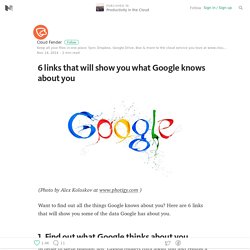
Here are 6 links that will show you some of the data Google has about you. 1. Meet Cody Wilson, creator of the 3D-gun, anarchist, libertarian. Why do we all feel compelled to tweet after a tragedy? Milan travel: Love me Tinder. “I think you are the most difficult date of my life.”

It is a gloriously warm October Saturday evening in Milan and things aren’t going terribly well. We are standing – Stefano, a 34-year-old artist, and I – outside Princi café in the posh Brera district, watching a couple, entwined like pretzels, feed each other ice cream. Stefano makes one final romantic bid by suggesting that we get an ice cream, too, and I tell him I am lactose intolerant, even though I’m not. It is 7.05pm. The (one) simple thing fueling your social media addiction. What Facebook looks like without the numbers (Grosser) If friendships were ever about quality, rather than quantity, that certainly isn’t the case anymore: Virtually every Web site that governs our social interactions these days puts numbers front and center, like a bold-faced, numerical tally of your precise social worth.
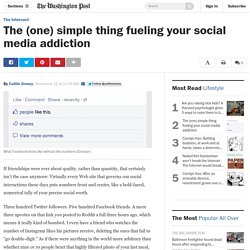
Three hundred Twitter followers. Five hundred Facebook friends. The numbers that keep our world afloat. Here is a quick quiz of three questions that you will get wrong. Don’t worry, everyone gets them wrong. But try to be the least amount of wrong possible, and write down your gut estimations: • How long is a million seconds, and how much longer is a billion seconds? Today’s key fact: you are probably wrong about almost everything. Britons overstate the proportion of Muslims in their country by a factor of four, according to a new survey by Ipsos Mori that reveals public understanding of the numbers behind the daily news in 14 countries.
People from the UK also think immigrants make up twice the proportion of the population as is really the case – and that many more people are unemployed than actually are. Such misconceptions are typical around the world, but they can have a significant impact as politicians aim to focus on voter perceptions, not on the actual data. Bobby Duffy, managing director of the Ipsos Mori social research institute, said: These misperceptions present clear issues for informed public debate and policymaking. For example, public priorities may well be different if we had a clearer view of the scale of immigration and the real incidence of teenage mothers. What does (European) schooling do to religious belief and practice? A new paper from Pogorelova and Mocan: We exploit information on compulsory schooling reforms in 11 European countries, implemented in the 1960s and 70s, to identify the impact of education on religious adherence and religious practices.
Using micro data from the European Social Survey, conducted in various years between 2002 and 2013, we find consistently large negative effects of schooling on self-reported religiosity, social religious acts (attending religious services), as well as solitary religious acts (the frequency of praying). We also use data from European Values Survey to apply the same empirical design to analyze the impact of schooling on superstitious beliefs. We find that more education, due to increased mandatory years of schooling, reduces individuals’ tendency to believe in the power of lucky charms and the tendency to take into account horoscopes in daily life.
FireChat, l’appli anti-coupure de réseau des manifestants à Hong Kong. Valérie Trierweiler’s book is captivating France – for all the wrong reasons. Snowden: I Left the NSA Clues, But They Couldn’t Find Them. Granta 92: The View from Africa. Short guide to lazy EU journalism. KONY 2012. Guest post: Joseph Kony is not in Uganda (and other complicated things)
The Road to Hell Is Paved with Viral Videos - By David Rieff. Click here to see photos of the evolution of the LRA. The Return of Wood: New Designs for An Age-Old Material. Photo courtesy Orée It feels a little ridiculous calling something as classic as wood a trend. But recently it’s become impossible not to notice that wood has had a design resurgence. Dwell is “loving” what it calls this fall’s “warm wood tones” trend. The Wall Street Journal reports on the trend in minimalist wood kitchens, including newfangled wood-effect laminates that lend the authenticity of wood at a lower price point. And earlier this year, Herman Miller launched the Eames Molded Wood Side Chair, a reinterpretation of the classic molded plastic 1950 chair designed by Charles and Ray Eames that uses cutting edge 3-D veneer technology to mold santos palisander, white ash or walnut into the complex curves of a single shell.
Photo courtesy Herman Miller. Grand Budapest Hotel poster and typeface: Futura is out, and Wes Anderson’s new font is Archer. Glenn Greenwald’s Partner Detained By British Security; Was Transporting Top Secret Documents. Bruce Schneier Discusses the NSA Documents. Burglars Who Took on F.B.I. Abandon Shadows. Si tu changes de trajet tous les jours, tu risques une attaque de drone. All Sites - Stack Exchange. How do I make a machine "blank screen" for a period of time (as a penalty) if certain noise levels are reached. How to delete your digital life. Christian Salmon et les « armes de distraction massive » We need to talk about TED. Kids can't use computers... and this is why it should worry you - Coding 2 Learn. Ruby, Ruby on Rails, and _why: The disappearance of one of the world’s most beloved computer programmers. Svbtle.